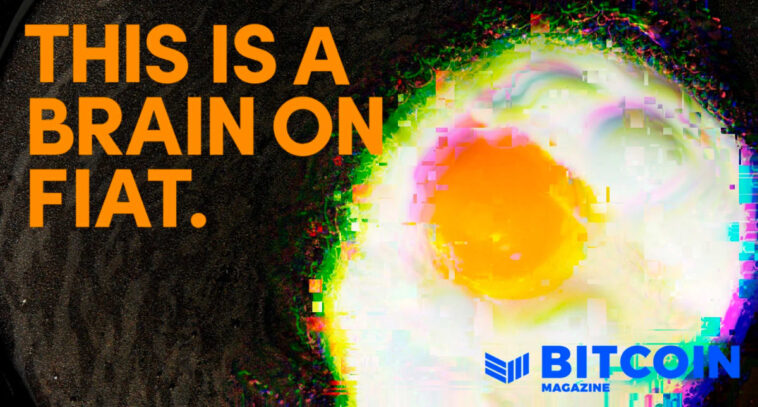Productive discourse requires the same attributes of “verify, don’t trust” that Bitcoiners espouse yet so often lack.
This article is not just for Bitcoiners — the same principles apply to misinformation and misappropriation in the wider world. If you are not a Bitcoiner, the concerns apply equally as well to your own mind, the wider world and its authorities.
Human Mind And Mindsets
Bitcoiners often and loudly lament various types of thinking in the fiat legacy financial system. We then extend the term “fiat” to mean a certain mindset in other areas, such as education and food.
The types of thinking that are maligned include areas such as short-term time preference, freedom, speech censorship and mass psychosis instead of individual critical analysis and thinking.
However, Bitcoiners are not immune to operating out of immediate or easy gratification, resorting to censorship or succumbing to false information from powerful or widely visible people shouting loudly or printing powerfully in the historical or current context.
Bastiat And Labor — Of the Mind
Here, let me introduce a revered historical figure in the Bitcoin space — Frederic Bastiat — so that my writing bears weight and triggers a neurochemical feeling of learning, accomplishment and reward.
As Bastiat wrote in “The Law” regarding those in power,
“Now since man is naturally inclined to avoid pain – and since labor is pain in itself – it follows that men will resort to plunder whenever plunder is easier than work. History shows this quite clearly.”
It takes a certain labor of the mind in order to learn deeply and to think critically. This is labor easily avoidable by all — not just by those in power.
When this labor is avoided, the result is not the plunder or robbing of others. Instead, it is the plundering of facts or the pursuit of truth in order to avoid labor or pain. This plunder of facts occurs in order to easily gain a semblance of knowledge or in order to believe whatever one wants to believe.
We’re all sometimes-hypocrites, operating out of the easy hit of short-term mindsets and neurochemical rewards. We are all sometimes as gullible to others’ statements, in the same manner in which we see others be gullible to the statements of authorities in the fiat financial and other world systems.
We Bitcoiners operate out of these similar mindsets when it’s efficient or fits our own biases. Or even if it’s just entertainment disguised as truth. It’s easier and faster to just trust instead of verify.
To appeal to pop culture, I’ll cite the popular Apple TV series “Ted Lasso”:
“Be Curious.”
Or, to give a hand-on-chin thoughtful feel, I’ll quote the well-known philosopher Michael Foucalt:
“Curiosity is a vice that has been stigmatized by Christianity, by philosophy and even by a certain conception of science. Curiosity, futility. I like the word however. To me it suggests something altogether different: it evokes ‘concern’; it evokes the care one takes for what exists and could exist; an acute sense of the real which, however, never becomes fixed; a readiness to find our surroundings strange and singular; a certain relentlessness in ridding ourselves of our familiarities and looking at things otherwise; a passion for seizing what is happening now and what is passing away; a lack of respect for traditional hierarchies of the important and the essential.”
The Foucalt quote took some effort to read and understand. There was a difficult adjustment beyond parsing Ted Lasso’s imperative.
As a quick summary of Foucalt, one thing he is saying is that you must take care and sit in uncertainty. Curiosity requires one to be uncomfortable and labor to look at things in another way.
Proof Of Stake Mindsets In A Proof Of Work Network
Less-than-ideal mindsets hurt Bitcoin education, understanding and product use and adoption.
Mindsets that persist into the Bitcoin community often mirror a proof-of-stake instead of proof-of-work thinking.
- Number of views or likes of a podcast or article or book or product means the content should not be questioned or refuted.
- Sponsorship of a podcast or event means 100% endorsement of that thing. What sponsorship means is that the sponsee must endorse and cannot criticize the product. It does not mean this product is the right product for you or that the product is without issues. Do your own research and testing, based on your needs.
- Number of Bitcoin Twitter followers or podcasts equals knowledge. On Twitter, the number of followers seems to mean proof-ofstake of all sorts of values and knowledge. Twitter and podcast personalities usually have some area of thought leadership and certain areas of astute knowledge — however, that does not mean knowledge in all areas. The best ones have humility and good character.
- Volume and tenor and swear words equal truth. No explanation needed here.
Now let me call out another thinker quoted by Bitcoiners with regard to learning — so that I can gain trust by association.
Eric Hoffer wrote:
“When people feel powerless and frustrated, the freedom they deeply ache for is a freedom FROM individual responsibility…..People join mass movements to become free of their individual self.”
It doesn’t just happen in the wider world; it happens in smaller communities too.
Isn’t this what many call a fiat mindset, succumbing to mass appeal, as opposed to an individually thought-through, logical, rule-based and well-researched mindset?
Problems then occur when well-known people within the Bitcoin community:
- Make lax statements of fact in their tweets or podcasts, and worse, in their books. This misinformation is then repeated by other Bitcoiners and journalists.
- Make statements beyond their area of knowledge that are then taken as fact. This misinformation is then repeated by other Bitcoiners and journalists.
- Make blanket ad-hominem attacks with no reasoning, disciplined structure, own research or logical argument. (An appeal to emotion and demonizing).
- Presume or assume wrong intentions based on one’s own trained filters, bias and noise.
- Take offense and don’t listen to real issues with their thinking or the products they produce or endorse.
In addition, some or even a small strain of truth allows a lot of lies or persuasive non-facts and debris to gain a captive mind of the masses.
Philosopher quote here to tie that chin-hand to my statements:
“Within every elaborate lie, a kernel of truth.” — Marisha Pessl
If you’re a well-known authority, you must do better.
Repetition Of Errors
When you see a cool, pithy statement, it feels good to be indignant or validated, and to volley a clever reply (or meme).
Your mesolimbic dopamine system is activated and gets rewarded — and you just want more.
People who read, listen or follow well-known people often:
- Repeat statements without fact-checking or doing their own critical thinking.
- Presume everything they hear from certain people is fact — beliefs that then lead to actions.
- Nod, and are afraid to question or refute statements. Valuing the person’s power over perspicacity, and catering to that.
- Buy or use a product without taking the time to have full knowledge of its strengths and limitations and security.
- Hit or say “like” in that burst of easy reward-validation and agreement, with no basis in facts.
Isn’t this short-term time preference versus what is best for the world?
I get it, we’ve all done the same. We all do it.
However, taking the time to investigate is how you hone your own thinking and knowledge. It’s how you do critical analysis and understand well enough to educate with integrity.
We all must do better.
Obviously, people have gained followers by knowing something that people want to hear. But again, truth often bleeds into non-truth.
In many cases, this lack of truth happens when venturing into informational real estate where one has not taken time to do the work of understanding beyond cherry-picking of data.
Dunning Krueger, Epistemic Exploration
Given the multidisciplinary nature and effects of Bitcoin, it is often necessary for Bitcoiners to venture into knowledge areas where they might not (yet) have enough knowledge to speak authoritatively.
Now let me cite a well-known study and effect that has been refuted and whose refutation further proves my point.
The Dunning-Krueger effect is “the cognitive bias whereby people with low ability at a task overestimate their ability.” We all intuitively know that’s not the full story. But, it’s actually been disproven. The original study showed that lower-competence people have a much higher view of their own ability while higher competence people underestimated their ability compared to the reality of their competence. There’s some nuance with types of measurements and variables, but the reality is that highly competent people can overestimate their ability just as much. The highly competent then often extend the dissonant view of their abilities to areas beyond their knowledge.
This is sometimes known as epistemic trespassing. However, I think in a world with more equal ability to deeply educate oneself, it’s better to call it epistemic exploration or something more benign. That said, when something incorrect is shouted by a well-known person loudly and authoritatively, it often substitutes for further exploration by those who hear it.
In that case, to turn a phrase, its epistemic trespassing flared and then capped with an authority bias — thus mining egregious misinformation.
Just because Elizabeth Warren or Ted Cruz are right or wrong in some areas, does not mean a pile of doo-doo for other areas. Just because a well-known person writes an “opinion” in Bitcoin Magazine or states it on a podcast, does not mean it’s actually factual or contextual.
Trite, but discard your confirmation bias and do your own evidence-based research.
Fact-Checking And Lateral Reading
How do fact-checkers check the credibility of information?
Lateral reading is one type of strategy. Lateral reading means that you cross-check everything.
In this informational deluge, it should become a habit.
There is a saying along the lines of “the Bible (or any other moral manual) in some people’s hand is worse than a bottle of alcohol in another’s.” People can also misuse and abuse well-known peoples’ quotes to add weight and believability to their points.
Check any author’s credibility, intent and biases by searching on similar articles on the same topics.
Or, look specifically at comments, criticisms and other peoples’ perspectives.
Peer-Review of Ideas In A Decentralized Space
In this decentralized space, peer review of thoughts often happens on Twitter. However, many well-known “thinkers” often appear not to be open to others’ thought-through and well-grounded refutations.
On a weekly (if not daily) basis, I witness statements similar to the below on the unwashed pool of BTC humanity — Bitcoin Twitter:
- Stating that number of followers means what you say on social media is for the most part unimpeachable. Any countering fact is trolling or FUD, even with highly respectful disagreement.
- Stating that number of followers means your knowledge or time is more valuable than others and dictates obeisance and accommodation.
- Stating that followers and celebrity tops behavior —the Reese Witherspoon effect. When caught drunk driving (RW) or tweeting delirious or far-fetched ideas:
“You’re going to be in trouble when you find out who I am.” - Stating that your ideas are original and others’ thoughts are cheap commodities or uninformed, when you are standing on the shoulders of giants with only a slight and powerful new twist.
Bitcoin obviously does not fix this.
Absence Of Evidence Does Not Mean The Evidence Is Absent
Bitcoin also does not fix this:
We talked about epistemic exploration. However, there is another side to this when assessing others’ knowledge or experience.
The presumption or assumption that someone does not know about a subject based on their paid work or credentials, some superficial and low-featured knowledge of that person or even some bias towards abstract membership of a gender, race, age or other type of group.
Knowledge can be free, and hence many people have credible information and work products without credentials. Check credibility in lieu of minimal context, race, gender, age or fiat credentials.
Taking this a step further:
Just because you have not seen or experienced something, does not mean the issue is not real for others. The threat or actuality of physical or verbal virtual abuse, does not mean it does not happen to others less privileged or less protected than you.
Absence of evidence is based on what one can see in their limited data-gathering capabilities, within their space and time horizon.
But worse, painting a group as all X or all Y is a bucket that just doesn’t hold water. Targeting an entire group based on the egregious behavior of a few is not accurate.
Smart people understand their ignorance of the unseen and seek out additional information for the who, why, what happened or is happening and where, instead of reducing multi-dimensional humans or entire groups to a few reductionist features of knowledge, experience or seen or unseen actions and inaction.
Striving But Not Insisting Or Resisting Integrity
The five virtues are compassion, courage, temperance, justice and wisdom. Effort in any one of these can be used to motivate oneself to dig deeper than that quick reward.
I believe Bitcoiners should strive to be more like the intention of this quote, as discussed in Shawn Amick’s Bitcoin Magazine article “Bitcoin’s Stock To Universal Flow: How Lao Tzu Teachings Underscore Sound Money’s Value.”
“The person of superior integrity does not insist upon his integrity; For this reason, he has integrity.” — Lao Tzu, “Tao Te Ching”
To think that one can and is building a better world with slapdash replies, sloppy sourcing, lazy bucketing, uncritical analysis of one’s beliefs, limited views or egotistic thinking, is hopeless, hapless and un-heroic.
If we view criticism of facts or probabilistic information as a narrative violation, then we’re repeating the problems of the wider financial world.
“Stay humble, stack sats” is one of the Bitcoin sayings that can actually build a better world.
But it’s still trite and limiting. How about:
“Stay humble, stack sats,
Learn, educate,
Listen to critics, and iterate.”
They say critics are your greatest teachers.
“The trouble with most of us is that we would rather be ruined by praise than saved by criticism.” -Norman Vincent Peale
Don’t take the “easy button” route of just trusting me, anyone or anyone who is or quotes a “someone.”
Verify.
Sources:
Academy of Ideas-Free Minds for Free Society https://academyofideas.com/2015/12/frederic-bastiat-the-law-summary-and-analysis/
https://growth.me/books/the-true-believer/ Accessed on 3/31/2022.
Humanists International, Michael Foucalt https://humanists.international/2007/11/michel-foucault/ Accessed on 3/31/2022.
Growth.me, https://growth.me/books/the-true-believer/
Accessed on 3/31/2022.
McGill University. “The Dunning-Kruger Effect is Probably Not Real” https://www.mcgill.ca/oss/article/critical-thinking/dunning-kruger-effect-probably-not-real
Accessed on 3/31/2022.
This is a guest post by Heidi Porter. Opinions expressed are entirely their own and do not necessarily reflect those of BTC Inc. or Bitcoin Magazine.





 BTC-USD
BTC-USD  ETH-USD
ETH-USD  LTC-USD
LTC-USD  XRP-USD
XRP-USD